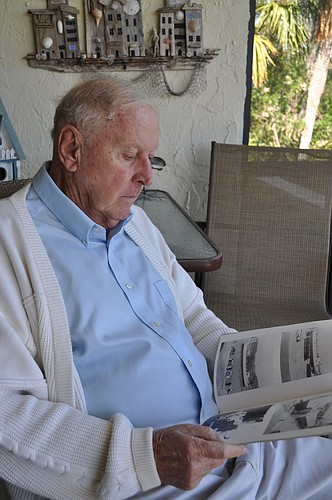- April 18, 2024
-
-
Loading

Loading

Bill Kelley could boast that he took part in the one of the largest military operations in history and received a letter of commendation for it, but he doesn’t. In fact, he almost downplays it.
The U.S. Navy veteran describes his experience as a medic pulling wounded soldiers off of Omaha Beach during the Normandy invasion with the quiet humility of a man who was simply doing his job.
“We were scared, but there was nothing we could do — the Germans were about that far away,” he says, pointing to a grouping of trees a few hundred yards away from where he now sits on the porch of his Longboat Key home.
“If somebody shot you, they shot you. When you’re in that situation you sort of forget where you are. You just go out there and do your job.”
Kelley enlisted in the Navy on July 15, 1943, shortly after graduating high school, in Syracuse, N.Y.
“In my initial interview, they asked me two questions: Had I ever taken aspirin, and had I ever been to a drug store. I answered yes to both, and suddenly I was going to medical school,” he says.
Medical school for a Navy medic at that time consisted of eight weeks of training, after which Kelley eventually found himself stationed in Southampton, England, aboard a tank landing ship, the USS LST-50.
“There were a lot of rumors going around regarding when D-Day would take place,” recalls Kelley. “It was so secretive that we weren’t even allowed off of base at the risk of the Germans finding out our plans.”
On June 6, 1944, Kelley and his shipmates got the order to move out, and they arrived on Omaha Beach, in Normandy, on D-Day “plus eight,” meaning eight hours after the Army Rangers made their first landing.
Kelley and the 50 other medics onboard the LST-50 immediately turned the ship into a hospital, bringing in wounded soldiers from both sides of the battle.
“We took the Germans, too,” Kelley says. “There was something about being in the medical corps that made you want to help people, regardless of who they were.”
Three times, Kelley and the rest of the medics transported wounded men and casualties of the war back across the English Channel to Southampton, where they dropped them off and loaded up with more equipment and soldiers to return to France.
Kelley and the other personnel of LST Group 12, which included the LST-50 and 11 other LST ships, later received a letter of commendation from their commander for their services.
Kelley was discharged from the Navy on May 7, 1946, after two years and 10 months of service. He returned home to Syracuse, where he worked in the concessions business for more than 40 years before retiring to Longboat Key.
Now 85, Kelley says he is able to fully grasp the meaning of his experience in the military.
“As you grow older, life becomes more valuable,” Kelley says. “When I read about the hundreds of thousands killed in the war, I realize how lucky I was. God shined his graces down on me that day.”
Contact Maria Amodio at [email protected].